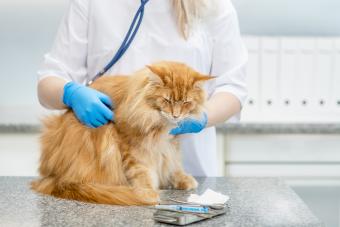
Pet owners consider their cats to be a part of their family. As a part of their family, they want to know everything there is to understand about their pet's health. One of these factors includes how often their cat should pee, what color the urine should be, and if there should be any odor. What is healthy? When should a cat owner be concerned?
How Often Cats Pee
There are a variety of factors that can influence how often your cherished feline uses the litter box. Cats have acquired an exceptional hydration system as a result of their evolution in Mesopotamia's dry climate. That means they often only urinate two to three times each day in most cases.
Water consumption is a significant factor in how often your cat visits the litter box. The level of wetness in their food has an effect as well: cats who eat wet food are more hydrated and pee more frequently. If it's a really hot or humid day, your cat may go less frequently than usual. Keep these factors in mind when considering how often your cat has urinated on the particular day you're examining them.

The frequency with which a cat pees might also be affected by medical issues. Cats suffering from renal illness or diabetes are more likely to urinate frequently. Bladder infections and liver problems can also affect how often your cat needs to go to the bathroom.
Cats Who Aren't Peeing as Frequently as Normal
A urethral obstruction may be seen in cats who urinate less frequently than usual. This is especially true of male cats who vocalize and appear to have a problem releasing urine. This can be fatal if not treated quickly, so bringing your cat to the veterinarian as soon as possible is critical.
There could be a behavioral explanation for how frequently a cat pees, especially if they're suddenly using the litter box less. Your cat may quit using the litter box if you don't clean it often enough or if it's not large enough to be comfortable.
Urine production may be reduced in older or disabled cats who have difficulties getting into the litter box.
In multi-cat households, the problem of one cat controlling access to the litter box and scaring the other kitty away from using it is common. One litter box per cat, plus one extra, is ideal.
Cats Who Are Peeing Too Much

Pollakiuria, or cats urinating more frequently, is a major condition in cats. Your cat is not peeing too much if they are urinating small amounts regularly; in fact, they may not be peeing enough.
Oliguria is a term used to describe a condition in which the kidneys produce less urine or the body eliminates less urine. The most common symptom of bladder irritation is frequent, small-volume voiding, which can be caused by:
- Idiopathic inflammation
- Infection
- Bladder stones
- Blockages
Increased frequency of a normal volume or increased efforts to urinate, on the other hand, are serious indicators of urinary issues, indicating probable irritation or a sense of urgency coupled with an inability to empty the bladder due to a blockage. Oliguria, or a lack of urine production by the kidneys, may be a compensatory response to other bodily fluid losses, or it may be pathogenic, but it is always significant. Address these symptoms as an emergency, and consult a veterinarian as soon as possible.
The Color of Normal Cat Urine
The urine of a healthy cat should be clear and pale yellow. The yellowish tint of healthy urine is sometimes described as "golden" or "straw-colored." It should not be hazy or difficult to see through the urine. Color changes (dark or light), cloudiness, or particle matter (debris within the urine) are all signs of bladder or kidney problems.
Dark Urine
Since dark urine in cats frequently comes from blood, it raises a lot of concern among owners. Hematuria is the medical term for this condition. There are numerous explanations for blood in your kitty's urine, making it difficult for you to determine the cause.
The most prevalent cause of bloody urine is idiopathic cystitis. This is a bladder inflammation that affects young cats in particular.
Other causes include urinary tract infection, cancer, trauma, and urinary obstruction. If there is dark cat urine in the litter box, you should contact your veterinarian, explain the details, and get an appointment as soon as possible.
The Smell of Cat Urine

If you have an adult cat who has been spayed or neutered, the urine smell is likely to be mild. Normal urine has a slightly pungent, acidic smell that is is generally weak. Cat urine with a strong, pungent odor is usually a sign of disease. Bladder infections and inflammations, as well as tumors and hormonal problems, can generate foul-smelling cat pee. Male cats, in particular, are prone to this.
Paying Attention Can Catch Problems Early
While there is no one-size-fits-all answer to how frequently a cat pees, there are some parameters that can help you determine if your cat is in good health. If you pay close attention to your cat's potty habits, you'll be able to spot problems early and seek immediate veterinary help if needed.







